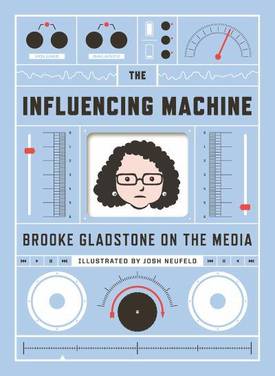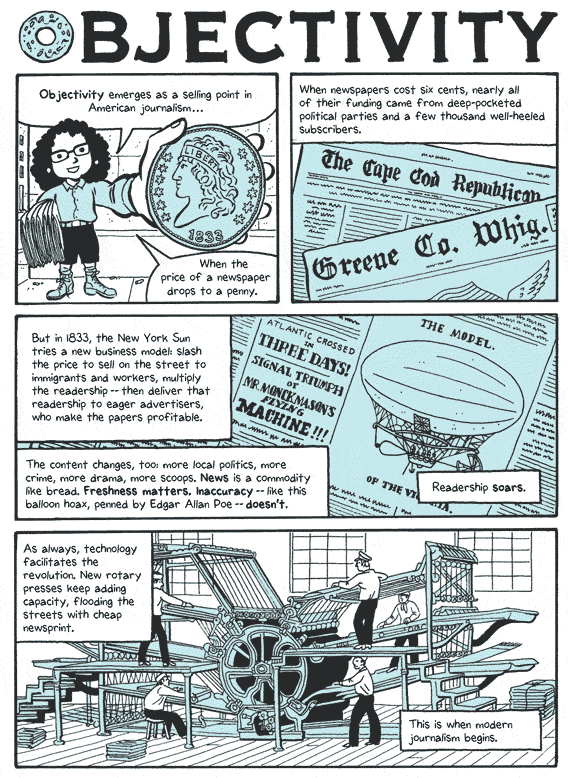I only heard about Brooke Gladstone, her fantastic podcast On the Media and this excellent book The Influencing Machine through the serendipity that sometimes can occur in a blog's comment section. I posted about podcasts, Eva asked for podcasts hosted by women, and Teresa suggested On the Media, which I started listening to immediately. And then she reminded me of Gladstone's book that she had reviewed, The Influencing Machine. And I went to the library and it was on the shelf and voila! Gosh, I love book blogosphere.
The Influencing Machine is a history of media and its manipulation. How biased is the media? Do we really want objectivity? And how do you define objectivity? And just how much science is behind those numbers they project?
This was the last book I read before I left on my trip, and I was surprised by how much it stuck with me. Not because I didn't enjoy it, but because I hadn't realized just how pervasive the media is in its influence. This book made it so clear to me. And I know I sound naive, saying I hadn't realized how pervasive the media is. I don't mean it that way. I mean, considering how pervasive the media is and how strong its influence on us, you'd think there would be more regulation or research or fact-checking or something. But there is a worrying lack of all those things.
Or is it worrying? Gladstone managed to terrify me about the way stories stick with us, even when it turns out they are completely wrong (for example, the idea of vaccines leading to autism). But she also made me feel just slightly better because apparently the media has always been biased and inaccurate, and we've managed to muddle through all right so far.
The idea, though, that the news we hear is not accurate, and even when there are retractions, we ignore them, is really disturbing. It's not that I expect everything to be 100% correct all the time, especially with reporting now happening live almost all the time. But I do worry about the stickiness of an idea and how the wrong idea can stick and create very real consequences. Especially when this is paired with the "fairness bias" that Gladstone mentions. People in the media are often worried that they are not viewed as being objective, so they are sure to present two sides to every story, especially science stories, even if one side is just wrong. This explains a lot about the continued belief in the vaccine-autism link that DOES NOT EXIST, and a host of other things that seem to get media attention without really deserving it.
I also really appreciated Gladstone's commentary on objectivity and how what we deem "objective" has changed over time. We think of it as being static, that we always want someone to present the facts and let us make up our own minds - but what are the facts we want presented? Whose stories do we want to hear? It's a good point to make, and really just helps to prove that the media is a reflection of our own thoughts and biases more than it is anything else.
I found this book very engaging and entertaining. I don't know that it had to be a graphic novel - in a way, it felt like Gladstone wanted to share a story and the illustrator wanted to be involved, so it became a graphic novel. There's a lot of text and facts and information and while I enjoyed the graphic format, I think that it could have been just as effectively told in a more traditional format (though not, perhaps, have appealed to the same audience). Gladstone points out so many interesting facts and ideas that it will definitely effect the way you approach media and your consumption of it. And if you listen to her podcast, the book complements the show very nicely and many of the same themes come up in both formats. A great read - thanks, Teresa!
The Influencing Machine is a history of media and its manipulation. How biased is the media? Do we really want objectivity? And how do you define objectivity? And just how much science is behind those numbers they project?
This was the last book I read before I left on my trip, and I was surprised by how much it stuck with me. Not because I didn't enjoy it, but because I hadn't realized just how pervasive the media is in its influence. This book made it so clear to me. And I know I sound naive, saying I hadn't realized how pervasive the media is. I don't mean it that way. I mean, considering how pervasive the media is and how strong its influence on us, you'd think there would be more regulation or research or fact-checking or something. But there is a worrying lack of all those things.
Or is it worrying? Gladstone managed to terrify me about the way stories stick with us, even when it turns out they are completely wrong (for example, the idea of vaccines leading to autism). But she also made me feel just slightly better because apparently the media has always been biased and inaccurate, and we've managed to muddle through all right so far.
The idea, though, that the news we hear is not accurate, and even when there are retractions, we ignore them, is really disturbing. It's not that I expect everything to be 100% correct all the time, especially with reporting now happening live almost all the time. But I do worry about the stickiness of an idea and how the wrong idea can stick and create very real consequences. Especially when this is paired with the "fairness bias" that Gladstone mentions. People in the media are often worried that they are not viewed as being objective, so they are sure to present two sides to every story, especially science stories, even if one side is just wrong. This explains a lot about the continued belief in the vaccine-autism link that DOES NOT EXIST, and a host of other things that seem to get media attention without really deserving it.
I also really appreciated Gladstone's commentary on objectivity and how what we deem "objective" has changed over time. We think of it as being static, that we always want someone to present the facts and let us make up our own minds - but what are the facts we want presented? Whose stories do we want to hear? It's a good point to make, and really just helps to prove that the media is a reflection of our own thoughts and biases more than it is anything else.
I found this book very engaging and entertaining. I don't know that it had to be a graphic novel - in a way, it felt like Gladstone wanted to share a story and the illustrator wanted to be involved, so it became a graphic novel. There's a lot of text and facts and information and while I enjoyed the graphic format, I think that it could have been just as effectively told in a more traditional format (though not, perhaps, have appealed to the same audience). Gladstone points out so many interesting facts and ideas that it will definitely effect the way you approach media and your consumption of it. And if you listen to her podcast, the book complements the show very nicely and many of the same themes come up in both formats. A great read - thanks, Teresa!


I've seen this one reviewed very few times. Definitely one I want to get around to.
ReplyDeleteMaybe I am naive too, I mean I know, but do I really know
ReplyDeleteI love the On the Media podcast! It's one of those things that makes Mondays bearable -- I come in and there's a nice new podcast all about media bias. It's great.
ReplyDeleteI actually like that this is in graphic format because I'm going to request it right away. Not that I wouldn't read it otherwise, but my attention span would probably suffer (I know, so bad!) Glad to have heard of this one - I can't wait to pick it up at the library.
ReplyDeleteThis is such a great book! I'm glad you enjoyed it. The graphic format was surprisingly perfect for all that Gladstone wanted to say.
ReplyDeleteI'm so glad that you enjoyed this! It gave me a lot to think about. I like how Gladstone thinks about this stuff.
ReplyDeleteFor me, the graphic format kept me on my toes and helped me pay attention. In a text-only format, it would be easier for me to tune out some of the facts.
I know what you mean about feeling naive for saying how the book made you realize how pervasive the media is. I haven't read the book, but I feel like you can "know" something but for day-to-day living, it's hard to keep my critical thinking cap on at all times. And books like this remind me to do that.
ReplyDelete